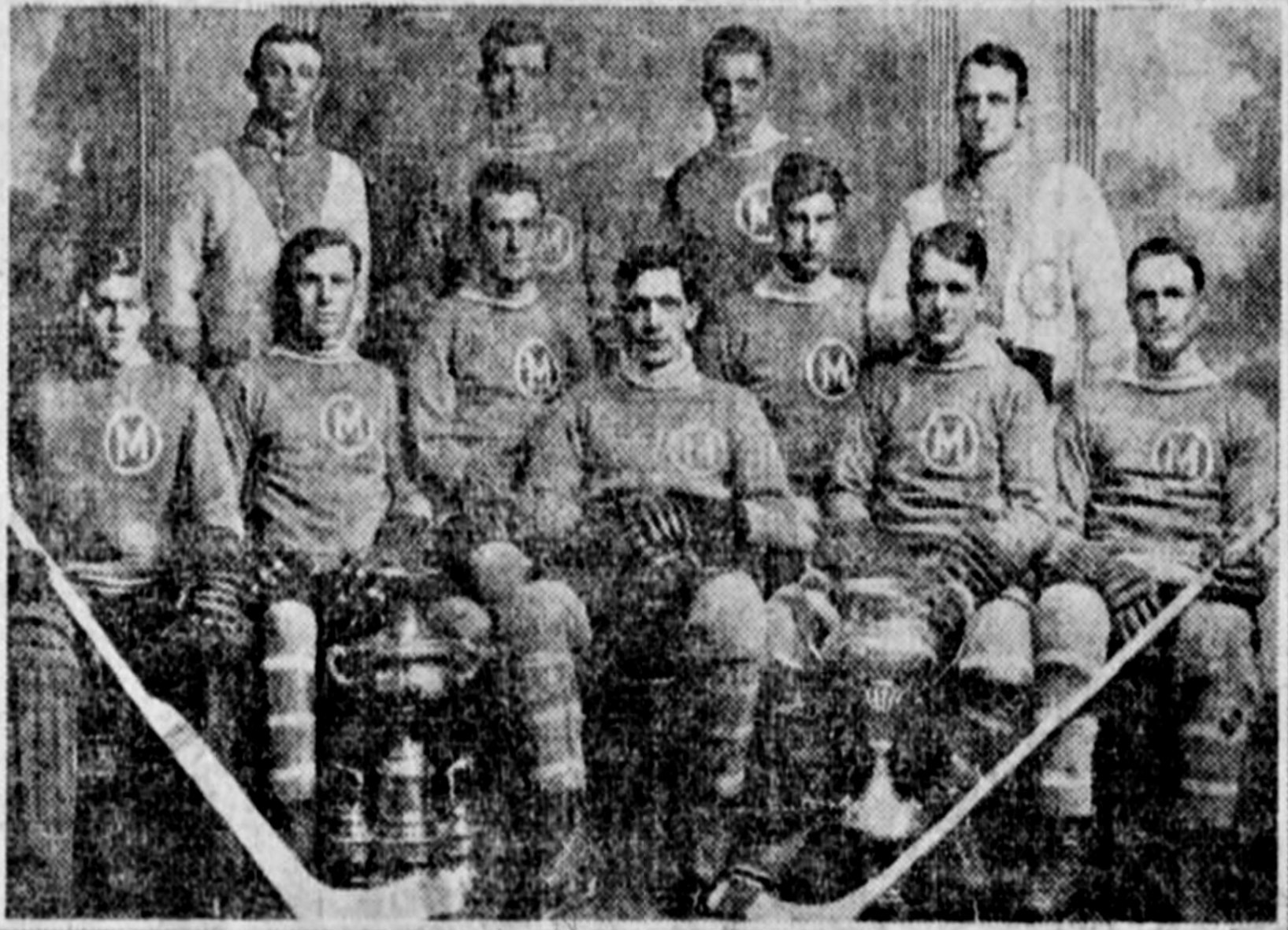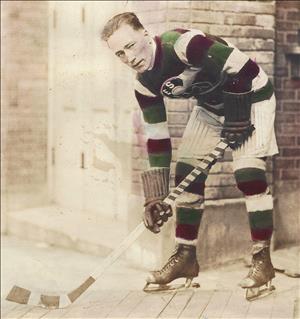The next day, Brougham wrote that a capacity crowd "saw the home club dish up one of the greatest exhibitions of hockey ever on up in the Fifth Avenue arena ... despite the failure of Bernie Morris, star forward of the Mets, to appear at his old position at center" ("Seattle Gets Big ..."). The Mets routed Vancouver 6-1 to all but clinch the series.
Morris? He spent the game in a jail cell. According to the Times, "between the first and second periods, Bernie's lawyer brought a message from the center at Camp Lewis to his fellow skaters in their dressing room. It was a simple message but it did the work. 'Fight like (expletive) tonight and win'" ("Seattle Overwhelms Vancouver ..."). The Metropolitans scored all six of their goals in the final two periods. Morris was "under arrest at Camp Lewis on a technical charge of evading the draft" ("Seattle Overwhelms Vancouver ...").
First arrested a week prior, Morris thought the charges a big misunderstanding. A Canadian citizen, he had been drafted into the U.S. Army. He was required by treaty to register for the draft because he lived in Seattle. Exempted by the Canadian military because he was married, Morris initially was given an exemption and low classification by Seattle's Draft Board Number 6. He was later reclassified and sent a summons to report for his physical on November 5, 1918 – six days before the armistice was signed. Morris stated "he did not receive his notice" ("Bernie Morris Convicted ...") though he admitted "that he failed to notify the draft heads of his change of address and declared in defense that his former landlord failed to forward his mail to him" ("Faces Charge ..."). When confronted with the charges, he claimed to live in Seattle only during the season and said he spent the off-season working for the Canadian government "as a civilian employee in the spruce production division" ("Faces Charge ..."). The draft board took him at his word and no charges were filed.
On February 14, 1919, however, Morris was granted a divorce from his wife on grounds of desertion in Superior Court in Seattle. His wife had refused to leave Moose Jaw, while Morris testified under oath that "his residence had been in Seattle for the past three years" ("Hockey Star Is ..."). To the draft board, this admission meant he had lied about living in the U.S. only during the season, and they immediately sought to prosecute. After his arrest, Muldoon and Frank Patrick "declared that the charges are unfounded and that Morris will be cleared upon a full investigation" ("Faces Charge ...").
The trial was heavily covered in the newspapers, and "consuming more time than that of any enlisted man ever held in camp since it was established" ("Defense In Patrick ..."). The head of the state draft board, Captain Irvin Ziegaus, "asserted that Morris 'is unquestionably a willful deserter of the most flagrant type' and 'has been playing loose and fast with the military authorities of both Canada and the United States since October, 1917'" ("Fight To Have ...").
On April 12, Morris was convicted and sentenced to two years of hard labor at the U.S. Military Prison – Alcatraz. It was "the first conviction on the Pacific Coast ... of an admitted subject of another country for refusing to comply with military orders issued by the United States" ("Hockey Star Is ..."). It also was the first "sentence for desertion here since the signing of the armistice" and The Associated Press called the trial "the most bitterly contested of any man yet tried at Camp Lewis" ("Hockey Star Is ..."). Morris and his lawyer felt he had "been the victim of high-handed methods on the part of Camp Lewis military authorities" ("Celebrated Hockey Player ..."). An exasperated Frank Patrick told reporters he'd "fight the case right up to the president of the United States" and "expressed confidence that the verdict announced yesterday would be set aside" ("Bernie Morris Convicted ...").
Incarcerated at Alcatraz
The case was "appealed in three different ways, through the military courts of the United States, through the civil courts of the United States and through the Canadian government" ("Will Make Fight ..."). On October 15, 1919, his appeal was denied in San Francisco with the United States District Court of Appeals ruling he "must serve out the two-year sentence imposed on him" ("Court Refuses Morris ..."). One week later, Pete Muldoon gave an interview in Vancouver stating that "Bernie may get everything fixed up in December" and be back playing for the Metropolitans ("Seattle Manager Back ...").
On March 13, 1920, exactly one year after his arrest, Morris was granted an Honorable Discharge from the U.S. Army. He raced back to Seattle, making the team train for a five-day trip to Ottawa and the 1920 Stanley Cup Final. "Muldoon announced that he would play" as Morris had "signed a contract in December" with the Metropolitans and remained on the team roster for the season ("Bernie Morris Back ..."). The Ottawa Citizen noted that Morris "got into some difficulty in connection with the U.S. draft law and though it was eventually straightened out and the Seattle star exonerated" he had not played that season. The Times reported his discharge, while the P-I never mentioned the situation; he simply reappeared in the Game 1 box score. On Morris's death certificate, he is listed as an Army veteran with dates of service from November 5, 1918, to March 13, 1920.
Return to the Ice
Morris played in all five 1920 Stanley Cup Final contests, starting Games 2 and 4 – both played by PCHA rules with seven men on the ice – though the Metropolitans lost the Cup to Ottawa. Out of shape, Morris performed well, with the Ottawa Citizen writing that "Morris is very dangerous as he slips in and out" ("Eastern Champions Came ...") and The Canadian Press reporting late in the series that he showed "with a little more training he would be one of the most dangerous men" on the Metropolitans ("Ice Title At ...").






